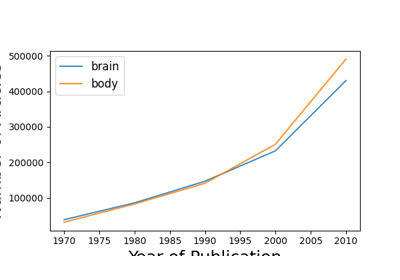lisc.Words¶
- class lisc.Words[source]¶
A class for collecting and analyzing words data for specified terms list(s).
- Attributes:
labelslist of strThe labels for each term.
has_databoolIndicator for if the object has collected data.
- resultslist of Articles
Results of ‘Words’ data collection for each search term.
- combined_resultslist of ArticlesAll
Results for each search term combined across individual articles.
- meta_dataMetaData
Meta data information about the data collection.
Methods
__init__()Initialize LISC Words object.
add_labels(labels[, directory, ...])Add the given list of strings as labels for the terms.
add_results(new_result)Add new results for a term to the current object.
add_terms(terms[, term_type, directory, ...])Add terms to the object.
Prints out the articles collected for each term.
Prints out the number of articles collected for each term.
check_terms([term_type])Print out the current list of terms.
copy()Return a copy of the current object.
drop_data(n_articles)Drop terms based on number of article results.
drop_term(label)Drop specified term(s) from the object.
get_index(label)Get the index for a specified search term.
get_term(label)Get a search term from the object.
make_search_term(label)Create the combined search term for a selected term.
process_articles([process_func])Process the articles stored in the object.
process_combined_results([exclusions])Process article data to create combined results, across all articles, for each term.
run_collection([db, retmax, field, ...])Collect words data.
set_joiners([search, inclusions, exclusions])Set joiners to use, specified for each term type.
unload_labels([verbose])Unload labels from the object.
unload_terms([term_type, reset, verbose])Completely unload terms from the object.
Attributes
Indicator for if the object has collected data.
Indicator for if the object has terms.
The labels for each term.
How many terms are included in the object.
- add_labels(labels, directory=None, check_consistency=True)¶
Add the given list of strings as labels for the terms.
- Parameters:
- labelslist of str or str
Labels for each term to add to the object. If list, is assumed to be labels. If str, is assumed to be a file name to load from.
- directorySCDB or str, optional
Folder or database object specifying the file location, if loading from file.
- check_consistencybool, optional, default: True
Whether to check the object for consistency after adding labels.
- add_results(new_result)[source]¶
Add new results for a term to the current object.
- Parameters:
- new_resultArticles
Object with collected data for a specified term.
- add_terms(terms, term_type=None, directory=None, append=False, check_consistency=True)¶
Add terms to the object.
- Parameters:
- termslist or dict or str
Terms to add to the object. If list, assumed to be terms, which can be a list of str or a list of list of str. If dict, each key should reflect a term_type, and values the corresponding terms. If str, assumed to be a file name to load from.
- term_type{‘terms’, ‘inclusions’, ‘exclusions’}
Which type of terms to are being added.
- directorySCDB or str, optional
Folder or database object specifying the file location, if loading from file.
- appendboolean, optional, default: False
Whether to append the new term(s) to any existing terms. If False, any prior terms are cleared prior to adding current term(s).
- check_consistencybool, optional, default: True
Whether to check the object for consistency after adding terms.
Examples
Add search terms, from a list:
>>> base = Base() >>> base.add_terms(['frontal lobe', 'temporal lobe', 'parietal lobe', 'occipital lobe'])
Add inclusion terms, from a list:
>>> base.add_terms([[], ['brain'], [], []], term_type='inclusions')
Add exclusion terms, from a list:
>>> base.add_terms([['prefrontal'], [], [], []], term_type='exclusions')
- check_terms(term_type='terms')¶
Print out the current list of terms.
Examples
Check added terms:
>>> base = Base() >>> base.add_terms(['frontal lobe', 'temporal lobe', 'parietal lobe', 'occipital lobe']) >>> base.check_terms() List of terms used: frontal lobe : frontal lobe temporal lobe : temporal lobe parietal lobe : parietal lobe occipital lobe : occipital lobe
- Attributes:
- term_type{‘terms’, ‘inclusions’, ‘exclusions’}
Which type of terms to use.
- copy()¶
Return a copy of the current object.
- drop_data(n_articles)[source]¶
Drop terms based on number of article results.
- Parameters:
- n_articlesint
Minimum number of articles required to keep each term.
Examples
Drop terms with less than 20 articles (assuming words already has data):
>>> words.drop_data(20)
- drop_term(label)¶
Drop specified term(s) from the object.
- Parameters:
- labelstr or int or list
The label of the term to drop. If str, is the label of the term. If int, is used as the index of the term. If list, drops each element of the list.
- get_index(label)¶
Get the index for a specified search term.
- Parameters:
- labelstr
The label of the search term.
- Returns:
- indint
The index of the requested search term.
- Raises:
- IndexError
If the requested term label is not found.
- get_term(label)¶
Get a search term from the object.
- Parameters:
- labelstr or int
The requested term. If str, is the label of the term. If int, is used as the index of the term.
- Returns:
- termTerm
The full search term definition.
- property has_data¶
Indicator for if the object has collected data.
- property has_terms¶
Indicator for if the object has terms.
- property labels¶
The labels for each term.
- make_search_term(label)¶
Create the combined search term for a selected term.
- Parameters:
- labelstr or int
The requested term. If str, is the label of the term. If int, is used as the index of the term.
- property n_terms¶
How many terms are included in the object.
- process_articles(process_func=None)[source]¶
Process the articles stored in the object.
- Parameters:
- process_funccallable, optional
A function to process article data. Must take as input an Articles object. If not provided, applies the default process_articles function.
- process_combined_results(exclusions=None)[source]¶
Process article data to create combined results, across all articles, for each term.
- Parameters:
- exclusionslist of str, optional
Words to exclude from the combined word collections.
Notes
This function will process the article data contained in the object.
- run_collection(db='pubmed', retmax=None, field='TIAB', usehistory=False, api_key=None, save_and_clear=False, logging=None, directory=None, verbose=False, **eutils_kwargs)[source]¶
Collect words data.
- Parameters:
- dbstr, optional, default: ‘pubmed’
Which database to access from EUtils.
- retmaxint, optional
Maximum number of records to return.
- fieldstr, optional, default: ‘TIAB’
Field(s) to search for term. Defaults to ‘TIAB’, which is Title/Abstract.
- usehistorybool, optional, default: False
Whether to use EUtils history, storing results on the EUtils server.
- api_keystr, optional
An API key for a NCBI account.
- save_and_clearbool, optional, default: False
Whether to save words data to disk per term, instead of holding in memory.
- logging{None, ‘print’, ‘store’, ‘file’}, optional
What kind of logging, if any, to do for requested URLs.
- directorystr or SCDB, optional
Folder or database object specifying the save location for any outputs.
- verbosebool, optional, default: False
Whether to print out updates.
- **eutils_kwargs
Additional settings for the EUtils API.
Examples
Collect words data for a set of terms, set to collect up to five articles each:
>>> words = Words() >>> words.add_terms([['brain'], ['body']]) >>> words.run_collection(retmax='5')
- set_joiners(search=None, inclusions=None, exclusions=None)¶
Set joiners to use, specified for each term type.
- Parameters:
- search, inclusions, exclusions{‘OR’, ‘AND’, ‘NOT’}
Joiner to use to combine terms, for search, inclusions, and exclusions terms.
- unload_labels(verbose=True)¶
Unload labels from the object.
- unload_terms(term_type='terms', reset=True, verbose=True)¶
Completely unload terms from the object.
Examples
Unload added terms:
>>> base = Base() >>> base.add_terms(['frontal lobe', 'temporal lobe', 'parietal lobe', 'occipital lobe']) >>> base.unload_terms() Unloading terms.
- Attributes:
- term_type{‘terms’, ‘inclusions’, ‘exclusions’, ‘labels’, ‘all’}
Which type of terms to unload.
- resetbool, optional, default: True
Whether to reset in/exclusions to empty lists.
- verbosebool, optional
Whether to be verbose in printing out any changes.



